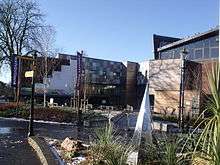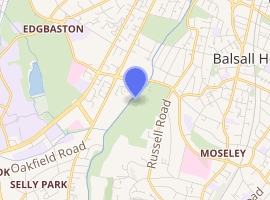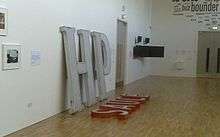mac, Birmingham
MAC (stylized as mac) (formerly Midlands Arts Centre) is a non-profit arts centre situated in Cannon Hill Park, Edgbaston, Birmingham, England. It was established in 1962 and is registered as an educational charity which hosts plays, concerts and films shows, and holds art exhibitions, music classes, and workshops for all ages.[1]
mac | |
 | |

| |
| Former names | Midlands Arts Centre |
|---|---|
| Location | Cannon Hill Park, Edgbaston, Birmingham, England |
| Coordinates | 52.4529°N 1.9039°W |
| Type | Non-profit arts centre |
| Genre(s) | plays, concerts, films shows, art exhibitions, music classes, workshops |
| Construction | |
| Opened | 1962 |
| Renovated | May 2010 |
| Website | |
| www | |
The centre re-opened in May 2010 after a £15m facelift. It has four performance auditoria, rehearsal and media studios, a cinema and art gallery. With 1,028,371 visits in 2015, mac is the 14th most-visited free attractions in England.[2]
History
The idea for an arts centre in Cannon Hill Park was the result of a meeting between local residents: theatre writer and director John English, his wife, Mollie Randle, and local politician Frank Price in the late 1950s.[3] Eventually 8.6 acres (3.5 ha) of land in Cannon Hill Park was made available by Birmingham City Council in 1962 for this purpose. It also housed the Cannon Hill Puppet Theatre under John M. Blundall.
In 1965 director Mike Leigh went to work at the theatre and started experimenting with the idea that writing and rehearsing could potentially be part of the same process. Between 1972 and 1987 it was the home of the former Birmingham Youth Theatre, a company aimed at encouraging and nurturing talent amongst people aged 15 to 23 who were not involved with drama or theatre. This company was founded by local teacher Derek Nicholls, who later became Director of the mac. Adrian Lester and Andrew Tiernan began their careers there.
Other artists who performed here include Yoko Ono, Kate Malone, and Ewen Henderson; and renowned musicians and bands such as Ruby Turner, Ocean Colour Scene, UB40, and ELO played at MAC in the early stages of their career. Indian classical dancer Nahid Siddiqui taught Kathak classes here, and famous Bharatanatyam exponent Chitra Bolar started teaching at MAC in 1978. Their contributions established MAC as a centre for South Asian dance and performing arts.[4]
The centre closed from April 2008 to 1 May 2010 for a £14.8 million refurbishment.
References
- Love, Catherine (3 April 2014). "Home is where the art is: the centres bringing culture to communities". The Guardian. Retrieved 25 July 2018.
- "Annual Survey of Visits to Visitor Attractions: Latest results". VisitEngland - Tourism business research. British Tourist Authority. 2016. Retrieved 2 December 2016.
- "Remember mac – 48 years of history". Archived from the original on 21 April 2013. Retrieved 6 March 2013.
- "History". Midlands Arts Centre.
